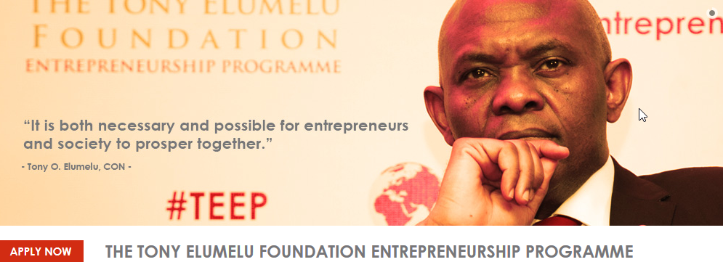- Germany, Tony Elumelu Foundation to Empower African Entrepreneurs
The German Government and Tony Elumelu Foundation (TEF) have reached agreement to train and support young African entrepreneurs as part of efforts to scale up the development of the African economy.
The TEF and Deutsche Gesellschaft für Internationale Zusammenarbeit (GIZ) GmbH, German Government’s Agency for International Cooperation, will empower 210 young African entrepreneurs, focusing specifically on female entrepreneurs and tech-enabled businesses.
The joint partnership will equip more African entrepreneurs with the skills needed to build strong and sustainable businesses, while providing them with access to seed funding. The partnership will be implemented by Make-IT in Africa, a programme GIZ is implementing on behalf of the German Federal Ministry for Economic Cooperation and Development (BMZ).
Make-IT already works in close collaboration with more than 20 corporate and financing partners, social enterprises, hubs, and networks to support an enabling environment for young entrepreneurs, to enable better access to finance, markets, and skills.
Chief Executive Officer, Tony Elumelu Foundation (TEF), Parminder Vir, said the partnership with GIZ ensures that more entrepreneurs across Africa will access seed capital, as well as the world-class TEF proprietary online training and mentoring programme.
“Since the launch of the programme, we have received over 300,000 applications, and we are actively looking at leveraging our success, so we can greatly exceed our own commitment to 1,000 entrepreneurs annually over 10 years,” Vir said.
Country Director, Deutsche Gesellschaft für Internationale Zusammenarbeit (GIZ) GmbH, Dr Thomas Kirsch noted that employment is the key measure for socio-economic development in Nigeria.
According to him, entrepreneurs and start-ups have the capacity to facilitate job creation in a way that was not imaginable 10 years ago.
“We have entered a new era where initiatives by the German government, such as Make-IT in Africa, could be instrumental in empowering youth by addressing the skills gap and connecting them to markets, corporates, and financing opportunities. We are encouraged by this partnership with TEF and the opportunity to create lasting impact in the lives of many,” Kirsch said.
The partnership is coming ahead of the largest gathering of African entrepreneurs – The Tony Elumelu Foundation Entrepreneurship Forum – which will hold on October 25, 2018 in Lagos, Nigeria. The Forum will celebrate the 2018 cohort of the Foundation’s beneficiaries. The entrepreneurship programme of TEF was launched in 2015, having supported more than 4,000 entrepreneurs with seed capital pan-African wide.
The TEF Entrepreneurship Programme is the $ 100 million flagship programme of the Foundation. It identified 10,000 African start-ups and entrepreneurs with ideas that have the potential to transform the African continent in the last 10 years. For TEF, the goal is to invest in the generation of at least 1,000,000 new jobs and to contribute $ 10 billion in new annual revenues across Africa.
The Foundation’s investment and commitment to advancing entrepreneurship is predicated on the belief that Africa’s entrepreneurs hold the key to unlocking the potential of the continent and to facilitating its transformation.


 Naira4 weeks ago
Naira4 weeks ago
 Billionaire Watch4 weeks ago
Billionaire Watch4 weeks ago


 Naira4 weeks ago
Naira4 weeks ago


 Naira3 weeks ago
Naira3 weeks ago




 Naira3 weeks ago
Naira3 weeks ago




 Naira3 weeks ago
Naira3 weeks ago




 Naira2 weeks ago
Naira2 weeks ago
 Commodities3 weeks ago
Commodities3 weeks ago





















